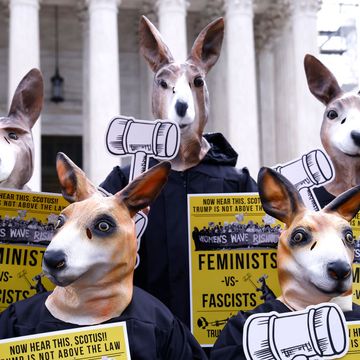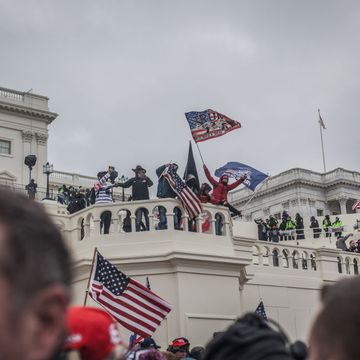"I not only think he's one of the best editors that I've ever known, but I consider him a close friend and I'm nuts about him."—Dean Baquet, Executive Editor, The New York Times
"He personifies the purest form of journalism. You want to believe that sort of editor is more than just an ideal. It's like seeing Santa Claus. 'Wow, someone like that really exists!'"—Janice Page, Deputy Managing Editor, Features, The Boston Globe
"He's not the easiest guy to deal with."—Alberto Ibarguen, Former Publisher, The Miami Herald
The Washington Post (2013 to today)
Armed with a trove of classified NSA documents from Edward Snowden, journalist Barton Gellman had a story to shop, but not every news outlet was interested. Too much risk, he says. And he would know: "I've been involved in some pretty hairy ones over the years," says Gellman, who worked for The Washington Post for 21 years before leaving in 2010. "I've never heard the lawyers talk the way they did on this story."
What about Martin Baron, The Post's new executive editor? Baron had just arrived from The Boston Globe, where he had spearheaded – on his first day on the job, no less – an explosive Pulitzer Prize-winning story (one of six Pulitzers in his 11 years there) uncovering clergy sex abuse in the Catholic Church. He had also held high-ranking editing positions at newspapers in Miami, New York and Los Angeles. The two didn't know each other, but Gellman knew Baron's reputation for dealing with sensitive stories that challenged powerful institutions. "Everyone said he'd been ballsy in Boston," Gellman says. It seemed like a potential fit, and he requested a meeting.
"I was very spooky and mysterious," Gellman says. "I said I had a secret, sensitive source who was promising a scoop on classified stuff and it was going to be at a far deeper level of secrecy than anything the Post had handled before, and I wanted legal cover and I wanted them to set up all kinds of security measures. I listened to myself and I thought I sounded crazy. Marty just sort of looked at me and said, 'That will work.'"
An agreement was made, and Gellman would go on to anchor The Post's Pulitzer Prize-winning coverage of NSA disclosures.
"I firmly believe in the work we do," Baron tells me in a recent interview, "and when there's a good story in front of you, no matter what the barriers are, no matter what the pressures are, we have an obligation to pursue it."
Spotlight, a film about The Globe's investigation into the Catholic Church under Baron's leadership, aims to tell a riveting detective tale built on shoe-leather reporting. But the film also reveals something to the rest of the country that many journalists coast to coast have known for some time—that Baron, 61, is one of the greatest newspaper editors of his or any other era.
There are universal characteristics often used to define great editors: intelligence, determination, fearlessness, news instincts, an unwavering moral and ethical compass, a fierce competitive drive, a tireless work ethic, and even a touch of compassion. Some editors possess a few of those traits, maybe several. "But [Baron] has all of those things," says Jeff Brazil, a reporter who worked under Baron at The L.A. Times. "And all these things add up to something that's almost magical."
As for how Baron views himself: "People don't have to like me, but I hope that they'll respect me."
The Los Angeles Times (1979 to 1996)
A Tampa, Florida native, Baron says he has been interested in journalism since junior high school. He later became editor of his high school paper, which, he recalled, published a story that the administration didn't like. "Whatever the subject was, it was deemed to be contrary to school spirit," he says. The administration pushed back. What happened next? "I'm sure I didn't back down," Baron says.
Then in 1979, three years after starting out as a reporter at The Miami Herald, Baron joined The L.A. Times, where, as a business reporter, he displayed a penchant for writing his way onto the front page, according to Paul Steiger, Baron's then-editor. "He was an obvious star," Steiger says. "He had an intensity about his coverage. He was determined to get the story." At 29, Baron was named business editor of The Times, and a colleague then – who asked not to be named – says Baron thus earned a nickname: "Boy Wonder."
The Times later tabbed Baron to be the editor of their Orange County edition, which they continued to staff up, further engaging The Orange County Register in an old-school circulation war. Baron immediately made his presence felt.
"I wanted to impress him," says Matt Lait, a reporter under Baron then and now The Times' city editor. "I wanted him to think I was a serious journalist, like he was. He made me better. He just made you want to be better."
The New York Times (1996 to 1999)
Baquet laughs as he recalls the late-night arguments. "He made people nuts," Baquet says. "He really did."
He's referring to Baron's stint at The New York Times, where, among his roles, Baron served as an associate managing editor who helped put the paper to bed each night. Being in that position meant being the final line of defense against mistakes or anything else that wasn't fit to print. It meant going in behind department heads and others and asking questions at late hours even of stories that had been edited several times.
"It meant that reporters had to go back and change their stories and editors had to go back and tell reporters to change their stories at 9 o'clock at night," says Baquet, then The Times' National Editor.
Baron says he's quite sure staffers were not happy to receive a phone call or visit from him during that time. "It was not a job to make you popular in the newsroom, and I don't know that I earned any popularity points at that stage of my career," Baron says. "But the risk was—we were responsible for what The New York Times was and we were going to be called to account if we didn't do our job."
And, Baquet says, that's what it's about with Baron—the work: "It was always about stories, it was always about coverage, it was never personal. He was trying to make the paper better."
The Miami Herald (2000 to 2001)
Alberto Ibarguen, The Herald's publisher at the time, and Baron sat in a car outside a Miami hotel after dinner. Baron was a top candidate to become the paper's executive editor, but there was no offer yet. Before bidding Baron adieu, Ibarguen asked his opinion about putting an advertisement on the front page. Baron was adamantly against it. Why would anyone even consider tainting that sacred piece of journalistic real estate in such a way? A passionate half-hour debate ensued, and in that moment Ibarguen made up his mind: "This guy is exactly who I need. He's just not going to roll over."
During his 18-month stint, Baron led the paper to a Pulitzer Prize for its coverage of the raid to recover Elián González, a Cuban boy at the center of a fierce immigration and custody battle, and Baron was named Editor of the Year by Editor & Publisher magazine.
He also continued to establish a hard-charging persona.
"Marty certainly pushed hard, but that's because he wanted the journalism to be first-rate and he didn't want us to try to cut any corners," Kevin Baxter, The Herald's Arts Editor under Baron, wrote in an email. "He wasn't there to make friends. He could be your friend—albeit at arm's length. But he wouldn't compromise the journalism to make friends or make someone feel better."
The Boston Globe (2001 to 2012)
When Baron received a first draft of the first story on the clergy sex abuse scandal by the Spotlight team, The Globe's investigative unit, it was between 4,000-5,000 words in length, says Walter "Robby" Robinson, the Spotlight editor at the time. Obviously, the story was delicate and complex following five months of reporting. But in two hours, Baron, a surgical line editor, returned the draft with a dozen or so questions about structure, conclusions on this issue, the need for more confirmation on that issue and more. "It was as if one of the smartest editors you had ever known had spent two weeks poring over your copy and sent back a brilliant first edit," Robinson says. "And he did it in two hours."
And despite all the reductions at The Globe under Baron, who says the staff was cut by about 40 percent during his tenure, Robinson says that Baron used his financial smarts—he has an MBA from Lehigh—to protect the staff from even deeper cuts.
"Marty acted like an editor, but he could think like a publisher, because he understood the economics of the business better than most publishers," Robinson says. "And so whenever it came to reduce the staff, Marty anticipated and Marty took steps, for instance, to bank positions. He left positions unfilled. He found ways to save money so that when he had to make reductions, there weren't as many people who lost their jobs. The way he handled that over a number of years caused considerably less pain to people than if anybody else had been editor."
The Washington Post (Now)
Baron would probably prefer if this piece hadn't been written. "I'm sort of uncomfortable with this focus on me," he says.
Baron prefers to remain behind the scenes, a guiding hand in the newsroom but often found in his office, working long hours—so long that in the past staffers have complained that they feel like they can't go home until he does. (In the film there are several scenes in which he remains a steady presence in the background, in that corner office.) He prefers to defer credit, saying that "a news organization is a team effort" and "I'm so dependent on the people with whom I work. I couldn't do my job without them." He adds, "What I've tried to do is I've tried to create the conditions that allow people to do their best work. I see that as fundamental to my job."
But then came a film that's being called the best newspaper film since All The President's Men. Now the focus has turned to him, and deservedly so. "He'll hate me for telling you this, but I'll tell you a recent anecdote," Robinson says.
It's September. They're at the Toronto International Film Festival, the six journalists portrayed by principal characters in the film. They gathered in a theater with maybe 2,400 others. Before the film ends, the journalists are ushered backstage. When it ends, the applause begins and lasts through the credits and continues as the director, Tom McCarthy, comes on stage and brings out the actors, who star in the film, then the journalists. The applause turns into a standing ovation that lasts for several minutes.
Backstage, before they receive that ovation, the journalists are there, together. And there, Baron does the very thing that he said he doesn't do: he becomes choked up.
"I always wanted to say to Marty, get a life. But after a while, it dawned on me that he had one," Robinson says. "And it was The Globe. And before that, it was The Miami Herald. And now it's The Washington Post. That's his life. I think some people would argue, well, look, that's not a well-rounded life. But I actually think for him, it is. Because he attaches so much importance to journalism."
His life is his newspaper. Does that capture Baron well?
"It might," Baron says with a quiet laugh. "Maybe too well."













